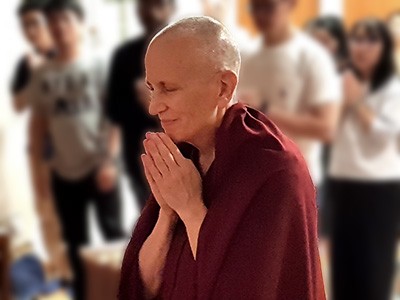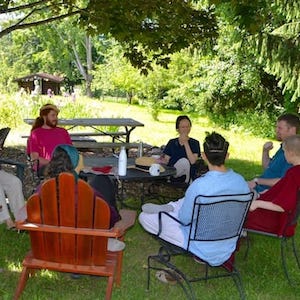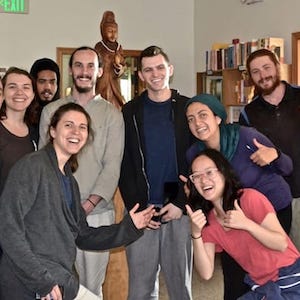The Ten Great Vows by Vasubandhu

The Ten Great Vows, based on great compassion, were written by Vasubandhu in the 4th century.
Therefore, in the initial generation of the resolve, it is the great compassion which is foremost. It is on account of the mind of compassion that one becomes able to generate ten ever more superior great right vows. What are those ten? They are:
1. “Regarding those roots of goodness I have planted in previous lives and in this present body, I pray that all of these roots of goodness may be bestowed upon all of the boundlessly many beings and dedicated to the unsurpassed bodhi. May it be that these vows of mine shall grow in each succeeding thought-moment, shall be produced again in each successive lifetime, shall always be bound to my mind, shall never be forgotten, and shall be guarded and retained by dhāraṇīs.”
2. “Having already dedicated these roots of goodness to bodhi, I pray that on account of these roots of goodness, no matter where I may be reborn, I shall always be able to make offerings to all buddhas and shall definitely never be reborn in a land where there is no buddha.”
3. “Having already succeeded in being reborn in the lands of the Buddhas, I pray that I shall always be able to draw personally close to them, shall follow along and serve them in every way (lit. “left-and-right”), shall remain as close to them as a shadow to its form, and shall never become distantly separated from the Buddhas even for the briefest of moments (lit. kṣaṇa).”
4. “Having already succeeded in drawing personally close to the Buddhas, I pray that they will then speak Dharma for my sake in accordance with whatsoever is appropriate for me. May I then straightaway perfect the bodhisattva’s five superknowledges.”
5. “Having already perfected the bodhisattva’s five superknowledges, I pray that I shall thereupon be able to reach a penetrating understanding of worldly truth together with its widespread artificial designations, that I shall also then completely comprehend, in accordance with its genuine nature, the foremost ultimate truth, and that I will gain right-Dharma wisdom.”
6. “Having already realized the right-Dharma wisdom, I pray that, free of any thoughts of aversion, I shall then explain it for the sake of beings, instructing them in the teachings, benefiting them, delighting them, and causing them all to develop an understanding of it.”
7. “Having already become able to create an understanding [of right Dharma] in beings, I pray that, availing myself of the spiritual power of the Buddhas, I shall be able to go to all worlds without exception everywhere throughout the ten directions, making offerings to the Buddhas, listening to and accepting right Dharma, and extensively drawing in beings [to the Dharma].”
8. “Having already received right Dharma in the abodes of the Buddhas, I pray that I shall thereupon be able to turn the wheel of the pure Dharma in accordance with it. May it then be that all beings of the ten directions’ worlds who hear me proclaim the Dharma or who merely hear my name shall then straightaway succeed in abandoning all afflictions and in generating the bodhi resolve.”
9. “Having already become able to cause all beings to generate the bodhi resolve, I pray that I may constantly follow along with them, protecting them, ridding them of whatever is unbeneficial, bestowing on them countless sorts of happiness, relinquishing my life and wealth for their sakes, drawing in beings, and taking on the burden of right Dharma.”
10. “Having already become able to take on the burden of right Dharma, I pray that, even though I shall then practice in accordance with right Dharma, my mind shall nonetheless have nothing whatsoever which it practices. May it be that, in this, I shall conform with the way that the bodhisattvas themselves practice right Dharma and yet have nothing whatsoever which they either practice or do not practice.”
“The Ten Great Vows” was translated from Chinese by Bhikṣu Dharmamitra.
Vasubandhu
Vasubandhu (fl. 4th to 5th century CE) was an influential Buddhist monk and scholar from Gandhara. He was a philosopher who wrote commentary on the Abhidharma, from the perspectives of the Sarvastivada and Sautrāntika schools. After his conversion to Mahayana Buddhism, along with his half-brother, Asanga, he was also one of the main founders of the Yogacara school. (Source: Wikipedia) Learn more: https://en.wikipedia.org/wiki/Vasubandhu


